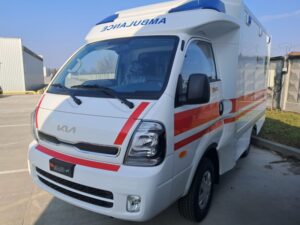
Ukraine has received the last 20 of 200 KIA BONGO ambulances as part of a humanitarian donation from the Government of the Republic of Korea.
According to the Ministry of Health, the total cost of all the vehicles donated in cooperation between the Korean Embassy in Ukraine and the Ministry of Health is over $12 million.
The donated vehicles are fully equipped with modern medical equipment necessary to save patients’ lives at the scene and during transportation to medical facilities. Each vehicle is equipped with defibrillator monitors, oxygen supply systems, trauma equipment, stretchers and emergency medicines.
The Ministry of Health emphasizes that since the beginning of the war, the enemy has destroyed or damaged more than 600 ambulances in Ukraine.
In total, thanks to the support of international partners, Ukraine has already received more than 1,500 ambulances, 73 of which are armored.
The renewal of the ambulance fleet began in 2020-2021, even before the full-scale invasion: 895 ambulances were purchased at the expense of the state budget. They ensured the stable operation of the system in the first difficult months of the war.
The Ministry of Health reminds that Ukrainian medical institutions have recently received 100 modern ultrasound diagnostic systems and 30 mobile X-ray fluoroscopic systems from the Government of the Republic of Korea as part of humanitarian aid.
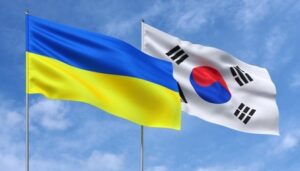
The Republic of Korea is providing $4.76 million to improve the efficiency and accountability of the Ukrainian government through a three-year project implemented by the United Nations Development Program (UNDP). On Monday, the leadership of UNDP Ukraine and the Korea International Cooperation Agency (KOICA) in Ukraine signed an agreement in Kyiv.
“The funds will be allocated through the project “Strengthening Digital Governance for Increased Efficiency and Accountability of the Government of Ukraine”, which will be implemented by UNDP in Ukraine in 2025-2027 in partnership with the Ministry of Digital Transformation of Ukraine and the Secretariat of the Cabinet of Ministers of Ukraine. The aim of the initiative is to increase the efficiency and transparency of the central government, primarily the Cabinet of Ministers of Ukraine and ministries, by developing and implementing digital tools for coordination, policy development, and monitoring decisions,” the UNDP Communications Department informed.
Among other things, the project envisages the introduction of “Actions for Civil Servants” to help optimize administrative workflows and improve interaction between government agencies and employees.
“We continue to build the most convenient digital state. We are launching new services, transforming entire areas of life, and removing bureaucracy. And every country that helps us along the way is our partner in change. So I am grateful to the Republic of Korea for supporting our initiatives that will help make the government’s work faster and more efficient,” said Mykhailo Fedorov, Deputy Prime Minister for Innovation, Education, Science and Technology Development and Minister of Digital Transformation.
The initiative aims to strengthen governance in Ukraine by digitizing government coordination processes, monitoring decisions using digital tools, improving policy development processes, and empowering civil servants to use the developed information systems.
“Korea supports Ukraine in this difficult time. Working with UNDP to develop digital technologies for government agencies is an example of our commitment to contributing to the country’s long-term recovery, which will have sustainable, resilient results that matter to all citizens,” said Lee Tae-kin, Director of the KOICA Office in Ukraine.
UNDP Resident Representative in Ukraine Jaco Silje emphasized the importance of the project for increasing the accountability of the central government. “The project will help to create digital tools that will greatly facilitate interaction for state executive authorities and the decision-making process. This will further improve planning and strategy development. In turn, this will help guide the reform and recovery process for government agencies,” said Silier.
It is emphasized that Korea, in cooperation with UNDP, provides support to Ukraine in a number of critical areas. Earlier, $20.79 million was allocated to support early recovery and local development projects in the war-affected Zaporizhzhia, Sumy, and Kherson regions. In addition, the Republic of Korea has supported efforts to improve services for people with disabilities and strengthen energy infrastructure.
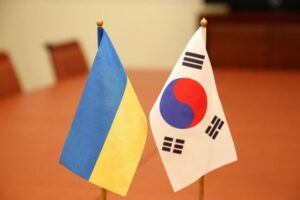
The Republic of Korea intends to participate in Ukraine’s reconstruction, as six pilot projects were unveiled during the Ukrainian-Korean Business Forum held in Kyiv on Thursday.
“Our partners’ support for our economy is very important. Investments in the renewal of Ukraine will create competitive jobs and bring Ukrainians back home. Our ministry wants to hear the opinion of business about the recovery process, business needs and problems. We are ready to work together to find solutions that will become a magnet for investment. Korean experience in transportation and technology is important to us. The Republic of Korea was able to become the undisputed leader in the industry. We present pilot projects that take this experience into account. We believe that together we will rebuild Ukraine for the prosperity of our peoples,” said Oleksandr Kubrakov, Minister of Communities, Territories and Infrastructure Development, during the event.
The Korean delegation, headed by Minister of Land Management, Infrastructure and Transport of the Republic of Korea Won Hee-ryong, included representatives of government and business, including KIND, K-water, NAVER Cloud, KEITI, Yooshin Engineering, Hyundai Motor Group, HD Hyundai Construction Equipment, Samsung C&T, Posco International Corporation and other Korean associations and companies. The main sectors of focus are urban development, water treatment, reconstruction and development of transport infrastructure.
“We are already talking about implementing the first pilot projects for the restoration of Ukraine. By working on them, we hope that, based on Korea’s experience in post-war reconstruction, we will be able to help rebuild Ukraine and do it as soon as possible,” Hee-Ryong said.
According to him, six pilot projects were selected during a series of 13 bilateral video conferences.
The flagship project is a transportation master plan for the Kyiv region. It is planned to create a basic transport model, based on which to analyze problematic issues and conduct a feasibility study of the main project proposals. The implementation of this project will start in September.
According to the Minister, at the end of August, a “very unexpected” project was officially launched – the Uman Smart City Master Plan, which is expected to be implemented in 240 days. K-water was selected as the project’s executor. All segments and services in Uman will be launched: economy, security, mobility, environment, renewable energy, tourism, residence complexes, etc.
A large-scale project is a plan to support Ukrainian airports, focusing on nine regional airports, plus Boryspil and Lviv. Reconstruction/renovation options are being developed for the short and long term, for wartime and peacetime. After analyzing the data for each airport, we will assess the risks and possible solutions.
The wastewater treatment project in Bucha is extremely important for the development of the capital region.
“Korea has stricter requirements for sewage, and we have to comply with the standards. The project provides for real-time monitoring,” said Sin Hyun Choi, Director of the Overseas Construction Policy Department of the Ministry of Land Management, Infrastructure and Transport of the Republic of Korea.
The project in Bucha will start next year.
“I hope that the sewage treatment plant project we will implement in Bucha will give an impetus to the development of the entire northwestern region. Unfortunately, during the years of independence, no such project has been implemented in Ukraine that would meet modern world standards,” Bucha Mayor Anatolii Fedoruk commented on the implementation of the future project to Interfax-Ukraine.
According to him, this project can even cover “part of the Zhytomyr region.”
K-water has signed a memorandum of understanding that provides for technical assistance in the reconstruction of the Kakhovka dam; during the reconstruction phase, the company will provide technical support and possibly act as a sponsor.
The sixth project selected as a pilot project involves the renovation of railways, including the launch of the Kyiv-Poland high-speed train service.
“Korea has experience and resources. At this stage of planning, we need to see the options (for each of the pilot projects), evaluate their effectiveness, and only then involve companies in the implementation, choose options for participation, including concessions and public-private partnerships,” said Sin Hyun-cheol.
As reported, South Korean President Yun-Sook Yel promised to provide Ukraine with an additional $2.3 billion during the G20 summit in New Delhi to help the country restore peace and recover from the war with Russia. Of this amount, $300 million will come in 2024 in the form of humanitarian aid, and the remaining $2 billion in the form of low-interest loans through the Economic Development and Cooperation Fund (EDCF) starting in 2025.
“The budget of the first project is now known. It will cost about $800 thousand to create a master plan for the development of transport in Kyiv region. For five other projects, the budget for the development stage is currently being discussed,” Won Hee-ryong, Minister of Land Management, Infrastructure and Transport of the Republic of Korea, told the agency.
He added that it will be budget money, but “not necessarily from the $2.3 billion.”
During the business forum, a number of memorandums were signed, including cooperation between KIND (Korea Overseas Infrastructure and Urban Development Corporation) and the State Agency for Reconstruction and Development and Oschadbank, HD Hyundai Construction Equipment and Mykolaiv Regional State Administration and KBU (on the provision of construction equipment and educational cooperation).
Minister Hee-Ryong emphasized that the Republic of Korea views Ukraine as a long-term partner.
“We want to be a partner of Ukraine in 50 and 100 years,” the Minister said.
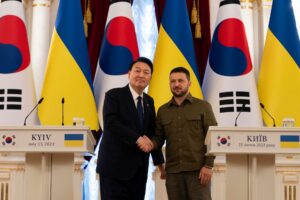
The Republic of Korea will increase military and humanitarian aid to Ukraine in 2023, Korean President Yoon Seok-yol said at a briefing after talks with Ukrainian President Volodymyr Zelensky on Saturday in Kiev.
“Last year we provided both body armor, helmets and other necessary ammunition. We hope that this year the level of our assistance will be much higher,” he said.
According to the President, “in May, President Zelensky and I agreed to supply the necessary equipment for such purposes as, for example, humanitarian demining, and we continue to do so. The government of the Republic of Korea allocated last year 100 million dollars in support of Ukraine. This year, that support will amount to 150 million dollars.”
“We also plan to increase aid to Ukraine to rebuild the education system. Last year…we decided to help rebuild destroyed schools. Also, we would like to provide Ukraine with support for future generations through the two presidents’ scholarship,” Yoon Seok Yol said.
According to him, “the situation in Ukraine now is similar to the situation in Korea 70 years ago.” “About 70 years ago, the Republic of Korea was also illegally invaded by North Korea. About 90% of our Korean territory was occupied and we faced the threat of extinction as a state. However, thanks to our military and civilians who helped them as much as possible, we were able to stop the occupier and kick them out of our land,” the president said.
“We have familiarized ourselves with the Formula for Peace that was provided to us and we do believe that it needs to be implemented. Especially since Korea is trying to play a mediating role in peace summits and meetings of countries belonging to the so-called Global South,” the Korean president also said.
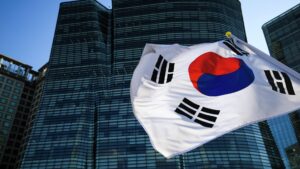
The government of the Republic of Korea plans to support the public and private sectors in the implementation of Ukraine’s reconstruction projects worth $52 billion, The Korea Herald reported, citing South Korean Presidential Secretary for Economic Affairs Choi Sang-mok.
“In May, through the channel of intergovernmental cooperation, Ukraine asked Korean companies to participate in about 5,000 construction projects estimated at $20 billion,” The Korea Herald quoted the secretary as saying on Friday.
He said the Korean government will begin evaluating construction sites where modular units will be built to quickly build infrastructure such as schools, housing and hospitals. The sites will be inspected with official development assistance funds.
In addition, the Republic of Korea plans to provide technical assistance for the rehabilitation of water infrastructure, and to supplement the humanitarian aid offered for the Kakhovka hydroelectric plant, which was undermined by Russian occupiers.
The secretary also added that support will also be provided for the private sector-led reconstruction project, which is currently estimated to cost about $32 billion.
“The project covers various sectors, including: nuclear power plants with small modular reactors, airport reconstruction, construction equipment, rail transportation and information technology,” the statement said.
“Although the war continues and the reconstruction work is in its early stages, we will prepare for our role in the reconstruction project as diligently as the Ukrainian government wishes,” Choi Sang Mok emphasized.
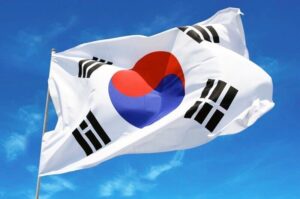
The Republic of Korea is interested in investing in projects to restore Ukraine’s infrastructure, First Deputy Chairman of the Verkhovna Rada Oleksandr Kornienko said.
“We are talking to them about the restoration of infrastructure. They are interested in it … South Korea is a country that can invest a lot in Ukraine and do a lot in terms of our reconstruction,” Kornienko said during a national telethon.
The first deputy speaker of the Ukrainian parliament noted that South Korea is providing humanitarian aid to Ukraine, recalling the agreement to provide Ukraine with 20 high-powered generators.
Kornienko also said that members of the Ukrainian parliament’s delegation discussed with their colleagues from the Republic of Korea “how to build a safe world after our victory.”
The first vice-speaker of the Verkhovna Rada expressed the hope that the delegation of the South Korean parliament will come to visit Ukraine.
“We hope that they will respond to our invitation and come to Ukraine with an official visit and see for themselves how it all happens. And then – we already know examples when countries changed their point of view on arms supplies to Ukraine (the Republic of Korea does not supply arms to Ukraine – IFU),” Kornienko noted.
As it was reported, the first vice-speaker of the Verkhovna Rada heads the parliamentary delegation, which is on a visit to South Korea on November 24-26.